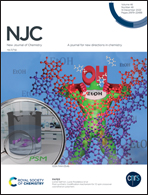Small molecule induces mitochondrial impairment in colon cancer cells†
Abstract
The mitochondrion is one of the most important organelles controlling multiple diverse biological phenomena. Consequently, mitochondrial dysfunction leads to the initiation, development and progression of cancer, especially colon cancer. However, development of novel small molecules to impair mitochondria in colon cancer cells is rare and less explored. To address this, herein, we have synthesized a novel small molecule library based on 3-methoxy pyrrole using a concise synthetic strategy. Upon screening in HCT-116 human colon cancer cells, one small molecule was identified to localize in sub-cellular mitochondria within 3 h and trigger mitochondrial damage through disruption in morphology. This small molecule-mediated mitochondrial damage generated reactive oxygen species (ROS), followed by induction of apoptosis and necrosis through the inhibition of anti-apoptotic Bcl-2, leading to remarkable HCT-116 cell killing without showing considerable toxicity towards non-cancerous HEK-293 human embryonic kidney cells. This novel small molecule can be further explored for mitochondrion-targeted colon cancer therapy.



 Please wait while we load your content...
Please wait while we load your content...